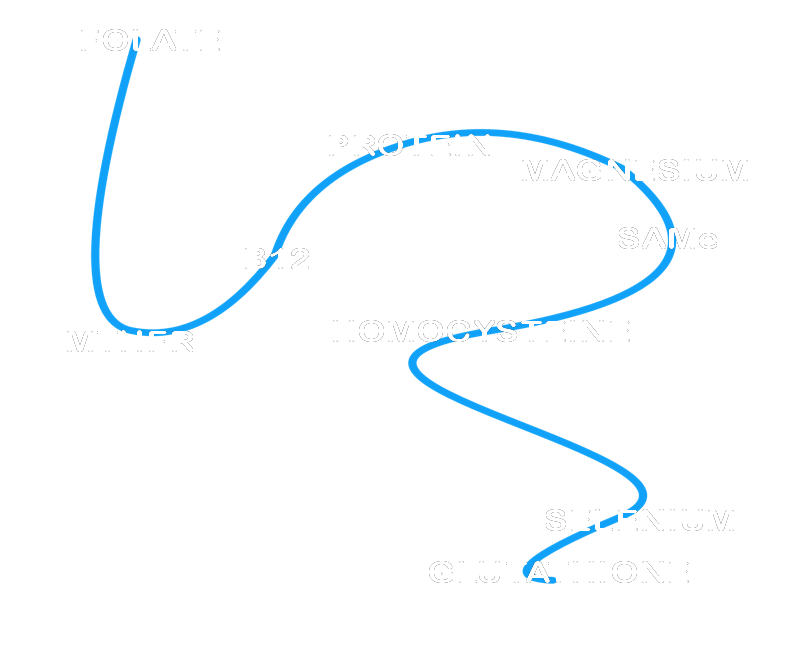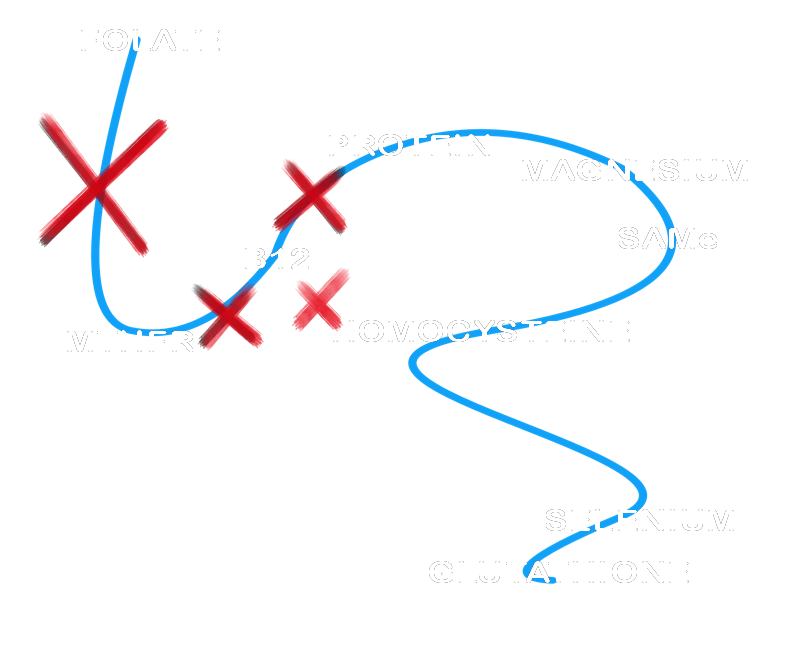Folic Acid is commonly added to bread-like products and even prenatal supplements. Folic Acid is found naturally in some foods, but never in the levels we are supplementing. Our body prefers Folate from fresh natural foods, or Folinic(Fol-in-ic) Acid if we must supplement. Some supplements have a balanced ratio of Folate and Folic Acid, which can be ok if done right.
When we don’t have enough Folate or we have too much Folic Acid, we can run into B12 deficiency symptoms which include and are not limited to:
- Developmental delays
- Anemia
- Weakness, tiredness, or lightheadedness
- Heart palpitations and shortness of breath
- Pale skin
- A smooth tongue
- Constipation, diarrhea, loss of appetite, or gas
- Nerve problems like numbness or tingling, muscle weakness, and problems walking
- Vision loss
- Mental problems like depression, memory loss, or behavioral changes
- From: https://www.webmd.com/diet/vitamin-b12-deficiency-symptoms-causes#2-6
And low Folate itself can cause:
- An increased risk of neural tube defects
- Cardiovascular disease
- Cancer
- Cognitive dysfunction
- From: https://www.ncbi.nlm.nih.gov/pubmed/24494987
In the 90s, we realized Folate(vitamin B9) is so important, that we started adding it to food and supplements. Except instead of adding Folate, we added Folic Acid, a man-made synthetic version of B9. Even if the synthetic version were identical to the natural form, nature doesn’t ever provide it in the large amounts we fortify food and supplements[1].
Folic Acid needs to be converted into tetrahydrofolate for our body to be able to use it. To do this, we depend on a gene called DHFR (dihydrofolate reductase), and even when this gene is healthy and functioning at peak performance, it’s still very slow[2]. Folic Acid also slows down the rate of real Folate. This means anytime Folic Acid is around in high quantities, we don’t have access to as much Folate. There is also some information pointing to increased risk of heart related issues and cancer with high Folic Acid intake[3]
When our body does not have proper access to a usable form of Folate, a large part of our methylation suffers and the rest of the system has to attempt switching gears. These images below show a simplified path of our methylation system. This system is complex and requires a lot of different nutrients to run properly, but when we’re missing something as important as Folate, the whole system will be affected. The somewhat common gene expression referred to as MTHFR causes similar situations.

Simplified methylation path

Poor Folate intake inhibits B12 and homocysteine recycling
This next paragraph sounds crazy, but it’s really not if we simplify what’s happening. Methionine is protein, either from diet or recycled homocystiene. We use ATP and magnesium to “activate” this methionine in a weird way (methylate). This turns it into SAMe which is now able to help create some of the happy-juice our brain needs like dopamine and serotonin etc. Once that SAMe is used for mainly brain stuff, it can then be used as SAH to create adenosine which is great for our heart and it’s rhythm etc. Now it’s converted back into homocysteine, and we don’t want it to stay here. One way to use it efficiently is to recycle it back into methionine, so this whole process can happen again. But in order to do this, we need properly activated folate as well as properly activated B12. Proper folate + proper B12 + homocysteine = methionine.
Without activated Folate, B12 isn’t able to recycle homocysteine back into methionine. Elevated homocysteine is a problem all by itself. Part of the issue is the fact that homocysteine can be toxic, and help form blood clots and plaque, but it’s also an indication that methylation is not ‘firing’ correctly. If methylation isn’t running well, there’s more to worry about than homocysteine most likely.
If our digestive system is not up to par, we may have a hard time getting B12 to our cells to begin with. There are 3 natural forms we can supplement with, methylcobalamin (MeCbl), adenosylcobalamin (AdCbl), and hydroxycobalamin (OHCbl). Some people can absorb some of these forms better than others. I try to get as many forms as I can with most nutrients, because sometimes our body is able to absorb certain ones better it seems.
Some people have been led to believe methylcobalamin B12 is better because it has the ‘methyl’ attached, but this is incorrect. Each of these forms will be broken down to cobalamin before our cells add a new methyl back onto it as it’s time to help recycle homocysteine.[4]
If our stomach acid is not correct, Vitamin B12 cannot be absorbed properly. Poor stomach acid, usually low acid, is rather common. Unfortunately, B12 is not our only worry when it comes to poor stomach acid. Check out my page about how I see my thyroid working for a list of symptoms common for stomach acid and other common issues https://sickoftired.com/thyroid/
Some extra info
The DHFR gene that slowly converts Folic Acid into a usable form, also recycles BH2 into BH4 which is very important for our mental health. Nitric Oxide also interacts with this gene in an important way. Because of this information, I avoid methylated supplements other than the tiny amounts in Dr. Ben’s blends. So, instead of depending on folinic acid or methylfolate, I aim for my natural folate vs folic acid from fresh foods.
There is limited information about a potential connection between lithium and the cell’s ability to get the B12 and Folate into itself. Glutathione may have something to do with this as well, but this may be related to a general glutathione homeostasis that allows our cell to balance most of its nutrients. I noticed several of my B related symptoms improved when I tried lipsomal glutathione and small amounts of lithium orotate.
Supplement forms
Methylcobalamin
Adenosyl/Hydroxy
Folinic Acid
MethylFolate is another form of Folate that is found in food but also in small amounts. It may come in handy to support MTHFR gene mutations, but will most likely benefit from other nutrients. Plus there are important things happening between proper Folate and MTHFR that are skipped when supplementing with MethylFolate. More on this soon.
Links
Xenobiotica. 2014 May;44(5):480-8. doi: 10.3109/00498254.2013.845705. Epub 2014 Feb 4.
https://www.ncbi.nlm.nih.gov/pubmed/24494987
Folate, folic acid and 5-methyltetrahydrofolate are not the same thing.
Scaglione F1, Panzavolta G.
PNAS September 8, 2009 106 (36) 15424-15429
https://www.pnas.org/content/106/36/15424
The extremely slow and variable activity of dihydrofolate reductase in human liver and its implications for high folic acid intake
Steven W. Bailey and June E. Ayling
In the 1940s, high doses of folic acid were given as an experimental treatment to leukemia patients and the rate of proliferation of cancer cells increased.
https://www.drfuhrman.com/elearning/eat-to-live-blog/16/why-you-need-folate-and-not-folic-acid
2017 Feb; 16(1): 42–49.PMCID: PMC5312744 PMID: 28223907
https://www.ncbi.nlm.nih.gov/pmc/articles/PMC5312744/#__p28
Comparative Bioavailability and Utilization of Particular Forms of B12 Supplements With Potential to Mitigate B12-related Genetic Polymorphisms
Cristiana Paul, MS and David M. Brady, ND, DC, CCN, DACBN
2012 Feb;36(1):78-81. doi: 10.1016/j.canep.2011.05.003. Epub 2011 Oct 21.
https://www.ncbi.nlm.nih.gov/pubmed/22018948
Meta-analysis of cancer risk in folic acid supplementation trials.
Baggott JE1, Oster RA, Tamura T.